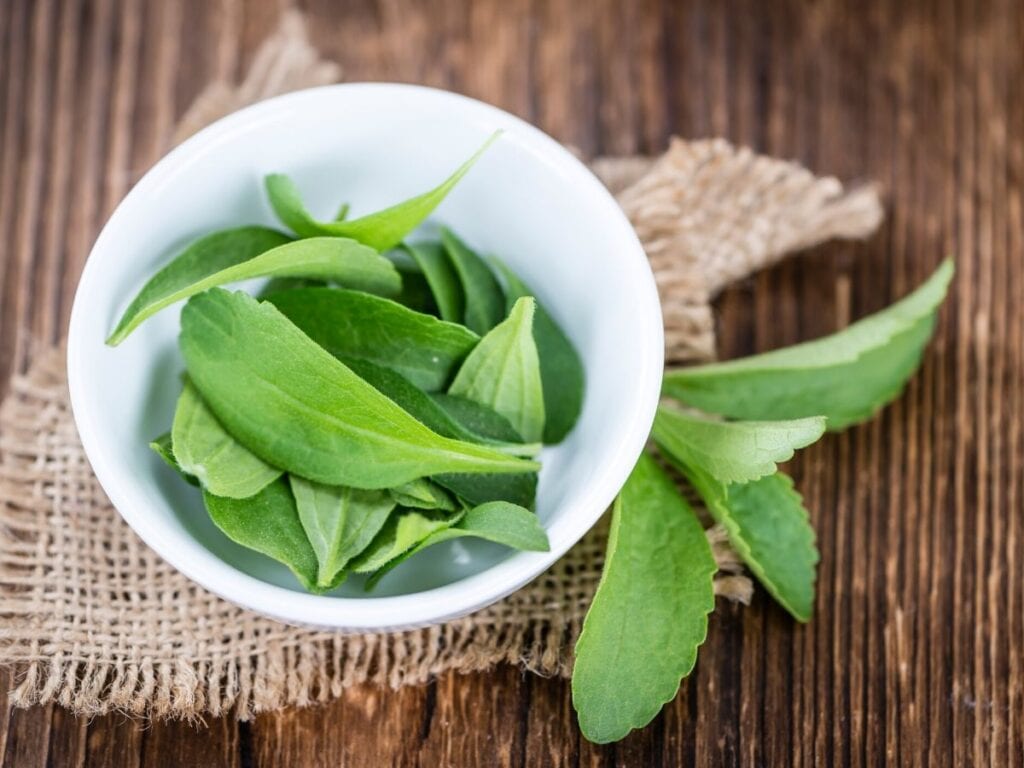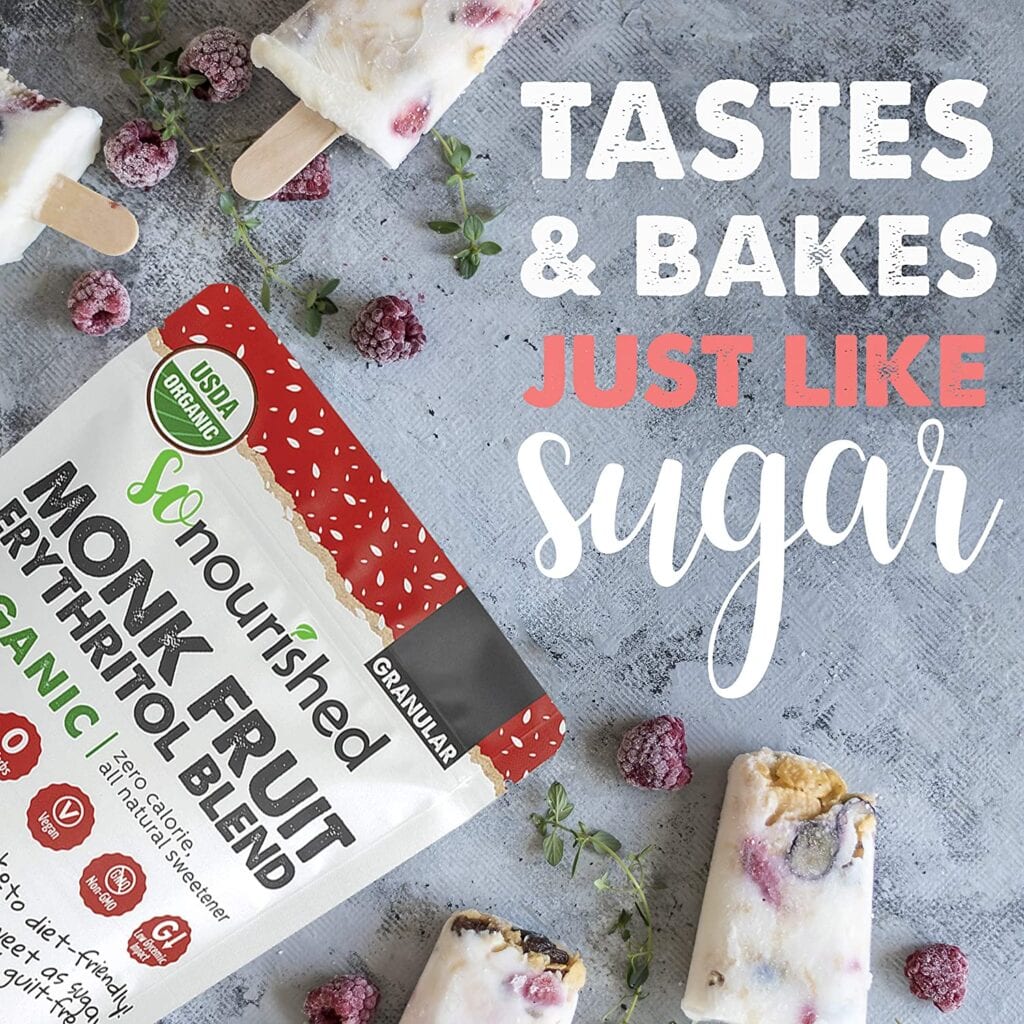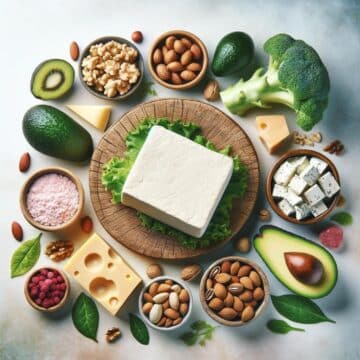When we choose a keto or sugar-free lifestyle, it means cutting out sugar completely. But does that also mean no more birthday cake, breakfast muffins, or ice cream? Of course not! Having a sweet tooth and being an enthusiastic baker we have to look for the right keto sweeteners for baking keto desserts.
Keto sweeteners taste and behave like sugar. But unlike regular sugar, keto sweeteners won’t raise your blood glucose and insulin levels.
In other words, they make it possible for you to enjoy dessert and stay in ketosis at the same time. Some of them even come with added health benefits.
However, not all sugar substitutes are keto-friendly. To help you choose the best and avoid the worst sweeteners for your keto desserts, we share this easy-to-follow guide, complete with a keto sweeteners list.
Why Avoid Sugar?
The term “sugar” refers to all forms of simple carbohydrates but also to table sugar. In this article, we’ll use this term mainly to refer to the latter.
With that said, you need to avoid sugar on keto specifically because it will keep you out of ketosis. Ketosis is the primary goal of the keto diet that can only happen if you avoid high-carb foods like table sugar.
But even if you don’t follow keto, it’s a good idea to keep added sugars to a minimum.
Researchers believe the ongoing obesity epidemic has a lot to do with the population consuming 300% of the recommended daily amount of added sugar [1]. And that makes perfect sense considering that sugar provides empty calories, raises insulin levels, and doesn’t keep you feeling full.
Consuming too much sugar has also been linked to caries, type II diabetes, metabolic syndrome, NAFLD, and cardiovascular disease [2].
Why Choose Keto Sweeteners Instead
Keto sweeteners are sugar substitutes that are compatible with the keto diet. They taste like sugar but don’t have the same metabolic effect. Some have fewer calories than sugar, while others leave the body unmetabolized.
In other words, they have little to no effect on blood glucose and insulin levels.
There are Three Main Types of Keto Sweeteners
- Natural
- Artificial
- Sugar alcohols
All come with their unique benefits. Natural sweeteners, for example, are the healthiest of the bunch and with little to no side effects.
Artificial ones are usually affordable compared to the rest.
And sugar alcohols usually have a taste very similar to natural sugar and are relatively cheap.
Many brands of sugar substitutes combine several low-carb sweeteners to provide the best flavor — they seem to cancel out existing after tastes when paired. You can do the same when using different sweeteners in recipes.
It takes a bit of trial and error to get the right level of sweetness with sugar substitutes.
Different sugar alcohols also behave differently in recipes. Some add bulk; others are great where browning is necessary.
And where health benefits are concerned, sugar substitutes can help you cut down on your added sugar intake and improve glycemic control [3].
However, not every sweetener is the healthiest and not every healthy sweetener can easily be used as a functional sugar replacement.
Natural Keto Sweeteners
A disclaimer: there’s some disagreement about what constitutes a “natural” sweetener. But here, natural simply means derived from natural ingredients and not produced in the laboratory.
Natural keto sweeteners are some of the best keto sweeteners for health and taste-wise. They include:
Stevia
Stevia is a natural sweetener, extracted from the leaf of the stevia plant, a bushy shrub native to Paraguay and Brazil and largely grown in Japan and China.
It is made through a process of drying, water-extracting, and purifying.
It has 0 calories, and 0 net carbs, and a glycemic index of 0.
People who want to cut back on sugar and dislike erythritol's cooling sensation on the tongue, often seek a solution in using stevia.
As it is 200 times sweeter than sugar, it means that 1 cup of sugar can be replaced with as little as ½ teaspoon of stevia extract powder or 1 teaspoon of liquid stevia extract.
That means that the bulk of the sugar or erythritol in baked goods is lost and needs to be replaced with other foods, like egg whites. Baked goods using stevia only, can end up denser, so one might want to add a bit more baking powder.
Stevia as a keto sweetener:
- Good in beverages;
- Needs additional bulking agent for baking;
- It can cause headaches for some as it belongs to the ragweed family;
- Sweetness: 200 times sweeter than sugar;
- Calories: zero;
- Taste: It can have a bitter aftertaste;
- Products: Powdered extract, liquid extract, and various blends (erythritol and stevia) that help get rid of the aftertaste;
Related: What You Should Know About Stevia for Keto Dieting
Monk Fruit
Monk fruit is another excellent choice when it comes to sweetening up your life on the keto diet.
Also known as lo han guo, monk fruit refers to sweet extracts from the fruits of the same name. It is also native to Asia and produced through solvent extraction.
It is usually combined with other sweeteners to balance out the flavor.
Again, 0 calories and glycemic index of zero. It is 150 - 200 times as sweet a sugar. The extract is very expensive, but if you were to use monk fruit extract instead of sugar, you would only need ⅙ teaspoon of monk fruit for each ¼ cup of sugar.
As with stevia, using monk fruit extract alone in baked goods would mean losing bulk. So prepare for smaller, fewer and denser desserts if you don't add a bulking agent to a recipe.
Monk fruit as a keto sweetener:
- Great in beverages;
- Needs additional bulking agent for baking;
- Sweetness: 150 - 200 times sweeter than sugar;
- Calories: zero;
- Taste: can be fruity and unusual but no unwanted aftertaste reported;
- Products: Powdered extract, liquid extract, various blends (erythritol and monk fruit);
Related: Monk Fruit: The Sweet Keto and Low Carb Ingredient
Allulose
Allulose is a rising star in the world of sugar alternatives. It is a new sweetener classified as a “rare sugar.”
It is naturally found in some fruits and is produced from corn and beet sugar through a natural enzymatic process. Trace amounts of allulose exist in a variety of edible substances that include wheat, raisins, figs, jackfruit, maple syrup, and molasses.
What’s great about it is that it seems to boost weight loss [4] while also behaving almost exactly like sugar in baking and cooking (caramelizes and browns).
Its chemical structure is the same as that of a typical carbohydrate, but it isn’t metabolized by the body. It has no effect on blood glucose levels.
Allulose offers about 70 % of the sweetness of sugar.
Although a teaspoon of allulose contains about 4 grams of carbs, it contains no NET carbs. Therefore, we can say that allulose is virtually carb-free. It is almost calorie-free as well.
It contains around 10% of the calories in sugar, which sums up to about 0.4 calories per gram. This is such a small amount that a keto fellow shouldn't worry about when enjoying a keto-friendly dessert.
Allulose as a keto sweetener:
- Great for baking;
- Good bulking agent;
- It does brown and caramelize;
- Sweetness: 70% that of sugar;
- Calories: 0.4 kcal/g;
- Taste: similar to sugar
Related: Is Allulose Keto? A Beginner's Guide
Swerve
Swerve is a blend of erythritol and oligosaccharides (plus some natural flavors in some of the products). Oligosaccharides are fermentable prebiotic fiber, otherwise known as inulin. These non-digestible carbs that act as prebiotics.
Combining these two ingredients makes for a sweetener that’s as close to real sugar as it gets while providing virtually no calories.
Having 0 calories, and zero impact on blood sugar levels, it can be used in keto baked goods instead of sugar in a 1:1 ratio.
It is a good bulking agent, and it comes in granular and powdered form. What is more, you can get a brown version of Swerve, which is a very welcome brown sugar replacement!
And last but not least, unlike erythritol alone, Swerve does caramelize.
Swerve as a keto sweetener:
- Great for baking;
- Good bulking agent;
- It does caramelize;
- Sweetness: As sweet as sugar;
- Taste: None to a minimal cooling effect on the tongue;
- Products: Powdered or granulated form, white or brown
Related: Swerve & Keto: Is Swerve Keto Friendly?
IMO Syrup
IMO syrup is a plant-based high-fiber syrup used for baked goods or beverages.
Rather than a bulking agent, it has excellent binding properties that come in handy when making the keto-friendly pastry, dough that needs to be rolled out, or homemade protein bars.
We sometimes use it in low amounts instead of honey or maple syrup.
What is controversial about IMO syrup is that it might impact insulin and blood glucose levels levels.
We use it where baked goods can benefit from it but it's actual usage in a recipe is up to a reader.
If you can, find gold IMO syrup to replace molasses and honey with.
IMO syrup as a helper keto sweetener:
- Great as a binding agent;
- Good at replacing honey or maple syrup in recipes;
- It gets solid when heated up and cooled;
- Not the best choice if you need to carefully watch your glucose and insulin levels;
- Sweetness: 60% as sweet as sugar;
- Calories: 18 kcal/g;
- Taste: No aftertaste. A gold/brown version can taste similar to molasses;
- Products: Plain (transparent) or brown/gold IMO syrup
Artificial Keto Sweeteners
Artificial sweeteners are a bit controversial. One reason is that studies have linked many of them to incidences of cancer. However, most of these studies were done in mice, and human studies don’t corroborate these findings [4].
They’re labeled as generally safe by the FDA, but that doesn’t tell us much about whether they’re actually good for you.
Nonetheless, there are some benefits to artificial sweeteners. For one, they’re typically cheaper compared to natural ones. Secondly, they have no calories.
When it comes to acceptable keto sweeteners that were man-made, if we had to choose, there’s one we'd use in our recipes:
Sucralose
If you’ve ever used Splenda, then you’ve tasted sucralose. Splenda is a zero-calorie sweetener that contains sucralose along with digestible carbs (e.g., maltodextrin), so it’s best to avoid it on keto.
But sucralose alone is ok. It is made from sugar through a chemical process in which hydrogen-oxygen groups are replaced with chlorine atoms. The end product tastes almost like sugar but has no calories.
Most sucralose sweeteners are mixed with bulking agents, so read the labels before making a purchase.
- Sweetness: 200-700 sweeter than sugar;
- Calories: zero;
- Taste: lingering sugar-like taste
Sugar Alcohols
Erythritol
Erythritol is a sweetener known as sugar alcohol. Sugar alcohols are types of indigestible carbohydrates, so neither sugars nor alcohols.
Erythritol is considered natural because it is produced through natural yeast fermentation of glucose.
It is most widely used when it comes to keto sweeteners for baking desserts. Made from fermented corn or cornstarch, it has no impact on blood sugar levels, has close to 0 calories, and close to 0 net carbs.
As it is only partially absorbed and digested in the intestines, it can cause some stomach discomfort in a minority of people but mostly has no side effects.
Erythritol as a keto sweetener:
- Most used keto sweetener;
- It's an excellent bulking agent;
- Doesn't dissolve in water as well as sugar and does not caramelize well;
- It can cause upset stomach to few people;
- Sweetness: 70% as sweet as sugar;
- Calories: zaro;
- Taste: It can have a cooling sensation on the tongue;
- Products: Granulated sweetener, powdered sweetener, various blends (erythritol and stevia, erythritol and monk fruit, etc.)
Related: Erythritol, the sweet ketogenic diet ingredient
Xylitol
Another sugar alcohol that’s a great keto sweetener is xylitol. It occurs naturally in some foods, such as strawberries and pumpkin.
It is produced from plant material by extracting a compound called xylan and putting it through bacterial or fungal fermentation.
Xylitol is known for its minty and cooling effect, which is why it is frequently added to chewing gum, toothpaste, and candy.
It has a low impact on blood sugar levels but does contain some calories, so be careful with the amounts.
Also, be careful when you have pets at home, as they can be sensitive to xylitol poisoning, particularly dogs.
Xylitol as a keto sweetener:
- Sweetness: 95% that of sugar;
- Calories: 2.4 kcal/g;
- Taste: sweet, with a cooling effect
Monk Fruit and Erythritol blend
The blend of monk fruit and erythritol has been, for now, our favorite choice for baking.
It is as sweet as sugar so that you can replace sugar 1:1 in any recipe.
The blend has all the benefits of erythritol and monk fruit: It is a great bulking agent, it comes in granular as well as powdered form, and supposedly has some beneficial antioxidative effects.
Moreover, because you use less erythritol, the cooling effect on the tongue is downregulated.
Monk Fruit and Erythritol blend as a keto sweetener:
- Great for baking;
- It's a good bulking agent;
- Sweetness: As sweet as sugar;
- Calories: zero;
- Taste: It can have some cooling effect on the tongue but significantly less than erythritol alone
- Products: Powdered or granulated form
Make your own homemade keto low carb sweetener blend. It is a low carb sugar substitute that is just as sweet as sugar.
You can find many sweeteners under different blends out there or you can buy a few ingredients and make a blend yourself.
Sweeteners to Avoid
The first group of sweeteners you need to avoid on keto is, of course, those that provide loads of calories from carbs, including:
- Table sugar
- Honey
- High-fructose corn syrup
- Maple syrup
- Molasses
- Agave nectar
These raise blood glucose levels quickly upon consumption, and you need to eat a small amount to be kicked out of ketosis. For example, just 3 tablespoon of honey will put you over your daily carb limit of 50g/day [5].
But some sweeteners seem keto-friendly but are not the best choice on this diet. Examples of such sweeteners to avoid are:
- Coconut Sugar
- Yacon syrup
- Maltitol
- Aspartame
Coconut sugar, for instance, is said to raise blood sugar levels more slowly than regular sugar. But it will still raise them eventually, and that will kick you out of ketosis!
Maltitol affects blood sugar levels and is usually added to products high in carbs.
Aspartame, while labeled zero-calorie, actually has the same amount of calories as regular sugar. The reason it is labeled as such is that only a small amount is typically used.
Keep an eye on these sweeteners, and always do your research with keto ingredients.
Summary
Going low-carb does not mean ditching sweets. You can still enjoy desserts and candy on keto, thanks to keto-friendly sweeteners. These sugar replacers provide the sweetness of sugar without carbs.
Some of these sweeteners are derived from nature, and keto eaters prefer them for their health benefits. Others are man-made but have properties that make them useful in keto baking, like browning, caramelizing, and adding bulk.
Of course, there are also sweeteners you need to avoid that are misleadingly labeled low-carb.
We hope this short guide has helped you separate the good from the bad in the world of keto sweeteners. Many of the options listed here are our personal favorites that you’ll find in our range of keto desserts.
Already use some of the above keto sweeteners? We’d like to hear about your favorites in the comments below.
References
Faruque S, Tong J, Lacmanovic V, Agbonghae C, Minaya DM, Czaja K. The Dose Makes the Poison: Sugar and Obesity in the United States - a Review. Pol J Food Nutr Sci. 2019;69(3):219-233. doi:10.31883/pjfns/110735
Paglia L. The sweet danger of added sugars. Eur J Paediatr Dent. 2019;20(2):89. doi:10.23804/ejpd.2019.20.02.01
Tandel KR. Sugar substitutes: Health controversy over perceived benefits. J Pharmacol Pharmacother. 2011;2(4):236-243. doi:10.4103/0976-500X.85936
U.S. Department of Agriculture. Agricultural Research Service. FoodData Central. Honey. Jun 2019.
What is your favorite keto sweetener for baking? Leave a comment below and let us know!








Sandra says
Thank you, a very interesting and informative article. I use all the items listed with the exception of swerve.
Marti says
what are you thoughts on xylitol
Amanda says
Curious what you’d suggest I use for baking, as when I tried Swerve it gave me the awful cold mouth after effect
Tisa says
That's erythritol in Swerve. It is hard to suggest anything rather than lowering the amounts of sweetener and trying different combinations (erythritol + monk fruit for example).
Lori Davis says
Would you be willing to provide the ratio you use when blending the Erythritol and Monk Fruit for baking?
Tisa says
Hi, Lori. I don't mix erythritol + monk fruit myself. I buy blends already on the market.
pouclet sylvie says
Bonjour où trouvez vous cela?? Quand je demande fruit du moine sur Amazon on me met Erythritol est la mm chose?? Merci
Tisa says
Salut,
Je crains que le fruit du moine ne soit pas encore approuvé à la vente dans l'UE.
Janp says
No diarrhea, but Swerve gives me intestinal upset (gas). I find that I need quite a bit of it to sweeten things.
Maltilol causes diarrhea and gas.
Can't stand stevia by itself but ok mixed with other sweeteners in small amounts.
I mix several sweeteners together and use the mixture.
Tisa says
That sounds like a good strategy. For me, interestingly, erythritol alone can sometimes cause intestinal troubles and thirst, and other times not. I prefer the mixtures, especially with monk fruit. Love Swerve, but I've never had a lot of it at once, so it hasn't had a chance to give me trouble.
Patricia Bargo says
We use erythritol and stevia products as our primary sweetners of choice. We do not have any problems with an insulin spikes, etc .and They are readily avaliable in the grocery centers where we shop and I do not have to order online.
Rhonda says
I do a lot of baking for friends and family and use erythritol mixed with a little stevia. I haven't tried monk fruit due to the cost, and I don't use Swerve for the same reason. I use a very small amount of black strap molasses with the erythritol when brown sugar is needed for recipes.
Tisa says
Thank you for the feedback, Rhona!
Judy says
Why is allulose not in your article? It is my favorite...
Tisa says
Thank you for your question, Judy. Admittedly, it is because I haven't had the opportunity to extensively try it out yet. I'll do it ASAP.
Mountain Girl says
We use Swerve for baking...….no after taste. It is expensive!
Maureen says
What are your thoughts on Pyure? That is the only sweetener that I use.
Tisa says
I haven't had a chance to try it yet. Hope to get some of it soon.
Joanne says
I like using Pyure and all the other sweeteners mentioned in this article. Sometimes I use a mix of monk fruit and stevia, too. They all seem to work well in baked goods.
Sharon Young says
What are the ones that cause diarhea? Sugar Alcohols.
Tisa says
None of the sweeteners listed above should cause diarrhea in a healthy person if used in moderate amounts.
That is why I list and use these sweeteners.
Artificial sweeteners that are sugar alcohols, like maltitol, can cause diarrhea in some people.
Sharon Young says
Thank you so much